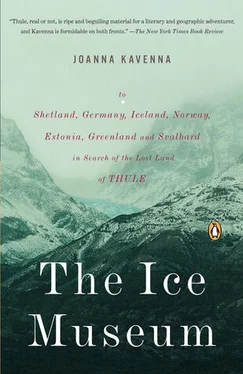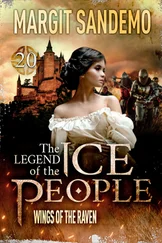FOR NOW WE’VE LEARNT WE MUSTN’T BE SO BUMPTIOUS
WE FIND THE STARS ARE ONE BIG FAMILY,
AND SEND OUT INVITATIONS FOR A SCRUMPTIOUS
SIMPLE, OLD-FASHIONED, JOLLY ROMP WITH TEA
TO ANY NATURAL OBJECTS WE CAN SEE . . .
The satanic rifts and belching devil pits were ancient and indifferent, and to keep doffing your hat and polishing off the best china for them was just as absurd as claiming to be master and lord over them, thought Auden. Mountains were pleasant in the dying sunlight, or under a rich red dawn: places to sit and watch a rustic scene or to set a camera on a tripod. The sublime was outmoded; when too many things were happening at home, Auden claimed that release lay not in intensity and passion, but in quietness and the non-event.
Auden and MacNeice came with all the phrases of the Victorians turning in their heads. Auden even produced a mock tapestry of quotes from earlier travellers, called ‘Sheaves from Sagaland.’ It was an array of bizarre sayings, compiled purely for the purposes of satire, full of profundities like ‘Iceland is not a myth; it is a solid portion of the earth’s surface’ or random outbursts like ‘Nowhere a single tree appears which might afford shelter to friendship and innocence, ’ or slurs on Burton’s obsession with polysyllables, with one of his choicer phrases—‘Ichthyophagy and idleness must do much to counter-balance the sun-clad power of chastity’—interpreted as ‘Eat more fish.’ They had dipped into everyone—Burton, Mackenzie, Ketil Flat-nose and his Saga friends—and they even found Shakespeare proving that nothing escaped him, using Iceland for an insult—‘Thou prick-eared cur of Iceland’—in Henry IV . They applauded William Morris, engaged in a dispute with his guide:
• Let’s go home. We can’t camp in this beastly place.
• What is he saying?
• I’m not going to camp here.
• You must. All Englishmen do.
• Blast all Englishmen.
‘Hear hear!’ wrote Auden.
Auden piled all these former remarks into a single chapter, mocking them gently and pushing them aside, except one. One remark jarred, having nothing to do with the Victorians’ Thule holidays: ‘ Für uns Island ist das Land ’—a phrase attributed to an unknown Nazi. For us Iceland is the Country. Auden laughed at it, adding a crack about Iceland’s apparently being German, but the remark dogged him as he wandered around. It was an absurd statement, but he found himself in absurd times. It was the only one of the statements that he couldn’t escape from. Unlike the others, which he could parody as the excessive remarks of a former age, this blank remark was part of the world Auden was trying to escape, the world of the stiff radio commentator, announcing the end of everything. It came from the suspense lurking under the dances and the parties, the febrile nerves of the 1930s.
During his visit, Auden was surprised by the quantities of German tourists travelling through Iceland on Aryan excursions. Auden found them on the bus to Mývatn, talking incessantly about die Schönheit , the beauty, of Iceland. But they meant a different sort of beauty, a different kind of purity; their interests had switched from landscape ecstasy to Aryan worship. ‘The children are so beautiful, lovely blond hair and blue eyes. A truly Germanic type,’ Auden heard them saying. The Victorians had admired the heirs of the Sagas, but they hardly had the same ideas as these later travellers, who applauded blond babies as part of the attractive scenery. One night, Auden shared a hotel with Hermann Goering’s brother and Alfred Rosenberg. He found himself exchanging small talk over breakfast with Goering’s brother, who looked, thought Auden, nothing like Goering. The Nazis, he wrote, ‘have a theory that Iceland is the cradle of the Germanic culture.’ Auden and MacNeice’s Letters from Iceland was published in 1937, as Europe prepared for war, as the last meaningless treaties were signed, and Hitler prepared to annex Austria. The poets wrote out their travels as a brief turn in a graver show: they had seen the devout Germans coming to worship at Saga sites. They observed the shift from the Victorians, trotting through Thingvellir, waxing about simplicity, to the Aryan tours of the 1930s.
The blankness of Thule could be enrolled in any schema of fantasies about the north. It was a blank white space, available for misuse, its silent ancient rocks hardly likely to protest. It was a story of a last land, which had been debated and embellished over thousands of years. In the interwar years, Thule, like so many other stories about the north, attracted German racists, brooding on the defeat of Germany in the First World War. They were compelled by Thule as a myth of a pure land, mixing it up with their own fantasies about a pure northern people, the Aryans. Their dogmatism went against the indeterminacy of Thule, which had always been a word which suggested the ends of the known world, the places beyond the power of humans to conquer and influence. The brutal ideas of the interwar period were scattered across the ice plains.
. . . ANARCHS, YE WHOSE DAILY FOOD
ARE CURSES, GROANS, AND GOLD, THE FRUIT OF DEATH,
FROM THULE TO THE GIRDLE OF THE WORLD,
COME, FEAST! THE BOARD GROANS WITH THE FLESH OF MEN;
THE CUP IS FOAMING WITH A NATION’S BLOOD,
FAMINE AND THIRST AWAIT! EAT, DRINK, AND DIE!
“HELLAS,” PERCY BYSSHE SHELLEY (1792-1822)
The idea of a land called Thule was taken up by a group of people meeting in Munich in the years after World War One. To disguise their activities, which were anti-Communist and anti-Semitic, they called themselves the Thule Society, and met in secret. The accounts of the Thule Society were garbled, written out by hysterical partisans, trying to make a name for themselves long after they’d been doomed to obsolescence, even by their former allies. But for a few years after the end of World War One, the Thule Society was a meeting point for future National Socialists, its guests and members including Adolf Hitler, Rudolf Hess, Alfred Rosenberg and Dietrich Eckart. The Thule Society was an early expression of the Nazi fetish for ‘Aryan’ tribes and northern lands, an early elision of an idea of natural purity with a belief in the racial superiority of a people. The Thule Society played a peripheral part in the agitation fomented in beer halls, the clandestine militias, the street battles, the rising suspicion of foreigners and the loathing of Bolshevism, out of which came the National Socialist Party. The Nazi obsession with northern lands was later forced onto the northern countries themselves when the German Army rampaged through Europe during the Second World War. Germanic racism, focused on Hitler, moved from ‘Aryan tours’ to violent invasions and breeding programmes.
In 1918 Munich was a faction-riddled warring city, tearing itself apart after the war. A city crammed with marginal elements, shuffling towards the mainstream, fighting on the streets. It was a city full of ready recruits for extreme causes. Disappointed soldiers, returning to a Germany made poor by the conflict, wandering the streets of Munich, looking for something to do, looking for an explanation for the chaos they had returned to. Disappointed civilians, who had lost members of their family and seen it had all been for nothing. A generation felt betrayed by the establishment, as in Britain and France, but this German generation was denied even the slender consolation of victory. The elegant streets of Munich’s centre were crowded with people chanting slogans, demanding nothing less than revolution. In November 1918, a Jewish journalist called Kurt Eisner led a march on Munich’s city barracks and the existing order collapsed. Eisner established a Bavarian Republic and presided over sprawling partisan chaos. He couldn’t grasp the city; he couldn’t persuade the Bavarians to accept a socialist revolution, anti-democratic as it became, increasingly remote from any ideals Eisner might have begun with. Initial idealism was replaced by a grim struggle for political survival.
Читать дальше












